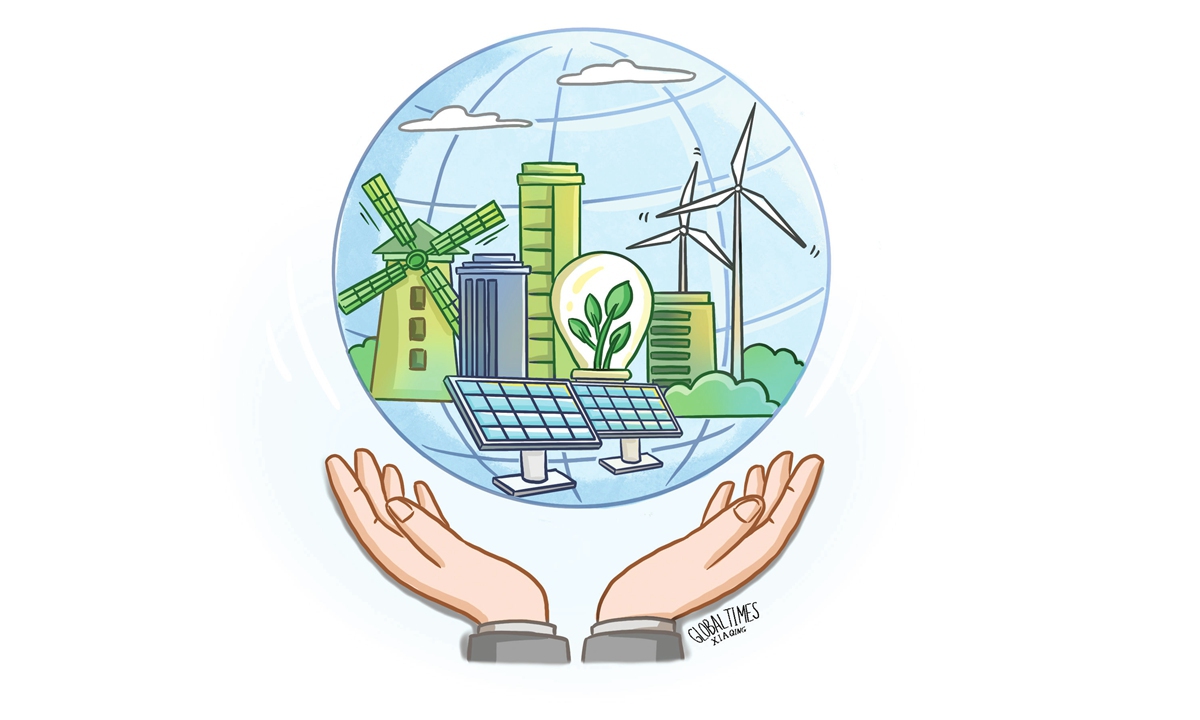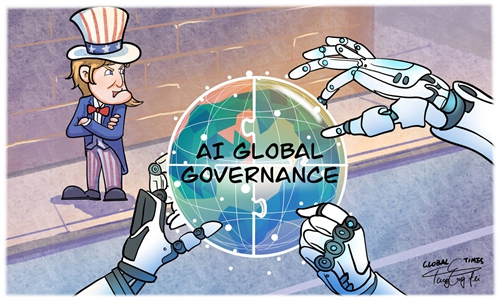
Illustration: Xia Qing/GT
The 29th session of the Conference of the Parties to the UN Framework Convention on Climate Change (COP29) is taking place in Baku, Azerbaijan, at a time when global climate governance will likely enter an era of "uncertainty."
At the conference, countries are generally concerned about whether the US will assume the responsibility of a major power in global climate governance in the future, and COP29 is considered an important opportunity to promote actions to respond to the climate crisis. As of May this year, 151 countries have committed to carbon neutrality targets, with 120 of them enshrining their dedication through laws or policy documents.
In the face of increasingly severe climate challenges, China is leading the way with its carbon peak and carbon neutrality goals, accelerating the comprehensive green transformation of its economy and society. The new European Commission is also committed to accelerating the EU's green transition. In fiscal year 2024, the World Bank Group delivered a record $42.6 billion in climate finance. The UK has closed its last coal-fired power station, and Australia is pushing for net-zero emissions and energy transition.
On the other hand, as the US accounts for about 13.5 percent of global carbon emissions in 2023, if it truly "unravels Biden's climate legacy," by 2030, the country's greenhouse gas emissions will increase by more than 4 billion tons compared to 2005 levels.
Ahead of COP29, the World Meteorological Organization released its latest report. The "State of the Climate 2024 Update for COP29" says concentrations of the three key greenhouse gases in the atmosphere - carbon dioxide, methane, and nitrous oxide - reached record high observed levels in 2023. And the year 2024 is on track to be the warmest year on record after an extended streak of exceptionally high monthly global mean temperatures.
As climate plans of many countries fall far short of expected goals, COP29 hopes to address three focus priorities through its two main pillars - "enhancing ambition" and "enabling action": making emergency emissions reductions, doing more to protect people from the ravages of the climate crisis, and tearing down the walls to climate finance. The aim is for parties to reach a fair and ambitious new climate financing target, improve Article 6 of the Paris Agreement, strengthen global financial institutions, and ensure private sector commitments to climate action. Financing discussions are a key focus at COP29.
In addressing the climate crisis, the most important issue is not financing or technology, but the fact that the existing climate governance systems are currently unable to tackle the climate crisis effectively. Two months ago, the UN held the Summit of the Future and adopted the "Pact for the Future," which covers new areas and addresses issues that have been unresolved for decades, including several points of consensus on sustainable development, climate and development financing. However, we still need to accelerate our efforts.
At COP29, the "China Pavilion" received special attention from attendees and the media. On one hand, China has been making solid progress in its carbon neutrality efforts, with effective policies and resolute actions, firmly pushing for green, low-carbon development and adhering to climate justice. On the other hand, in the context of increasing uncertainty in global climate governance, many countries hope that China can play a leading role in global climate action.
Currently, global climate governance needs to eliminate the phenomenon of individual countries acting alone. In terms of institutional building, global climate action must first reconstruct the climate governance system. Based on a global ecological consensus, we must focus on creating a new institution with legal authority and strong practical capacity, and design climate institutions for member countries that have legal standing. Economically, we must break free from the unreasonable framework led by wealthy countries. It may be worth considering, in legal terms, imposing taxes on giants in high-tech, petrochemical, manufacturing and trade sectors, and using direct or indirect methods such as transfer payments to allocate these funds for climate governance. Whether COP29 can be a climate conference that upholds commitments and makes progress in climate institutional innovation is of great importance.
The author is a professor at the Institute for Sustainability of Huzhou University and a researcher at the Budapest Centre for Long-term Sustainability. opinion@globaltimes.com.cn



